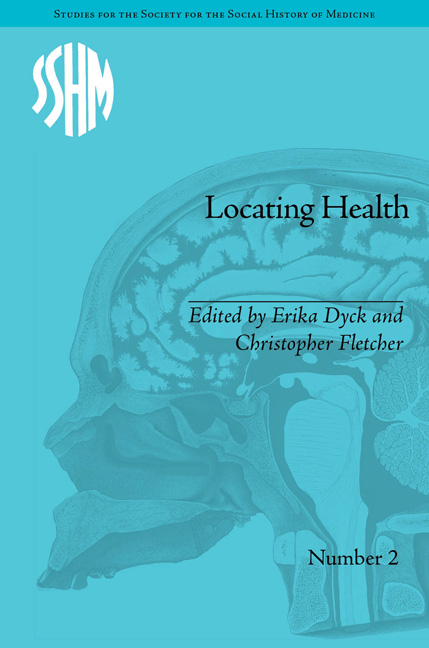Book contents
- Frontmatter
- CONTENTS
- List of Tables
- List of Contributors
- Acknowledgements and Preface
- Introduction: Healthscapes: Health and Place among and between Disciplines
- 1 Placing Maternal Health in India
- 2 Putting Medicine in its Place: The Importance of Historical Geography to the History of Health Care
- 3 Finding Place in The Big-Little World of Doc Pritham: Telling Medical Tales about Northwoods Maine, 1920s–70s
- 4 Putting Hyperactivity in its Place: Cold War Politics, the Brain Race and the Origins of Hyperactivity in the United States, 1957–68
- 5 Why Canada Has a Universal Medical Insurance Programme and the United States Does Not: Accounting for Historical Differences in American and Canadian Social Policies
- 6 Alberta Advantage: A Canadian Proving Ground for American Medical Research on Mustard Gas and Polio in the 1940s and 50s
- 7 Placing Illness in its Cultural Territory in Veracruz, Nicaragua
- 8 Chronic Disease in the Yukon River Basin, 1890–1960
- 9 An Ideal Home for the Consumptive: Place, Race and Tuberculosis in the Canadian West
- 10 Serbian Landscapes of Dreamtime and Healing: Clear Streams, Stones of Prophesy, St Sava's Ribs, and the Wooden City of Oz
- Notes
- Index
1 - Placing Maternal Health in India
- Frontmatter
- CONTENTS
- List of Tables
- List of Contributors
- Acknowledgements and Preface
- Introduction: Healthscapes: Health and Place among and between Disciplines
- 1 Placing Maternal Health in India
- 2 Putting Medicine in its Place: The Importance of Historical Geography to the History of Health Care
- 3 Finding Place in The Big-Little World of Doc Pritham: Telling Medical Tales about Northwoods Maine, 1920s–70s
- 4 Putting Hyperactivity in its Place: Cold War Politics, the Brain Race and the Origins of Hyperactivity in the United States, 1957–68
- 5 Why Canada Has a Universal Medical Insurance Programme and the United States Does Not: Accounting for Historical Differences in American and Canadian Social Policies
- 6 Alberta Advantage: A Canadian Proving Ground for American Medical Research on Mustard Gas and Polio in the 1940s and 50s
- 7 Placing Illness in its Cultural Territory in Veracruz, Nicaragua
- 8 Chronic Disease in the Yukon River Basin, 1890–1960
- 9 An Ideal Home for the Consumptive: Place, Race and Tuberculosis in the Canadian West
- 10 Serbian Landscapes of Dreamtime and Healing: Clear Streams, Stones of Prophesy, St Sava's Ribs, and the Wooden City of Oz
- Notes
- Index
Summary
When I began my work in India, I was struck by the incongruence between stereotypes of oppressed women and what seems like a powerful position attributed to them through the iconography of Hindu culture. Social statistics such as maternal mortality and morbidity rates, women's poor literacy and educational status, and the striking numbers of missing women observable in sex ratios all point to women's inferior social position while the Hindu pantheon and the manifestation of these goddesses in living women (e.g. Indira Gandhi was often depicted as Durga) spoke to their esteem and power. These two images of women, as otherworldly and subjugated, point to the need for research on the women's social condition that considers their status within a cultural tradition of gender and the social-structural conditions in which lives are lived. The timing of my research, in 1999 and again in 2001, corresponded with significant political and economic changes as India embraced neoliberal economic policies, opening her markets to the world. I emphasize that knowledge of maternal health, or any health issue, requires an understanding of the local sociocultural milieu, in order to grasp how social structures shape ‘local biologies’. In other words, the biology of pregnancy and maternal health is not disconnected from the place where women's everyday life is performed, a place which also encompasses past life histories of individuals, communities, and the nation-state.
- Type
- Chapter
- Information
- Locating HealthHistorical and Anthropological Investigations of Place and Health, pp. 11 - 28Publisher: Pickering & ChattoFirst published in: 2014



